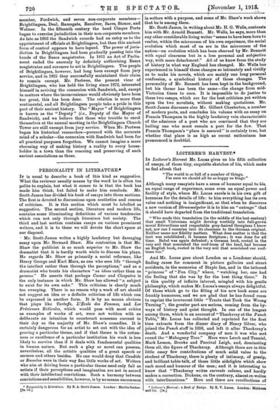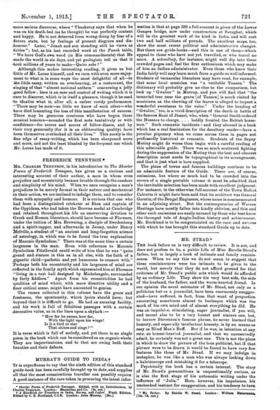LOITERER'S HARVEST.* IN Loiterer's Harvest Mr. Lucas gives us his
fifth collection of essays, of those tiny, exquisite sketches of his, which make us feel afresh that
"The world is so full of a number of things,
I'm sure we should all be as happy as kings."
Although many essayists have a sense of humour equal to his, an equal range of experience, some even an equal power and facility of style, where Mr. Lucas excels is in his own gift of keenness for the details of life: to him everything has its own value and nothing is insignificant, so that when he discovers a new version of Strutowelpeter it is to him an " outrage " that it should have departed from the traditional translation.
"Who made this translation (in the middle of the last century) that small Victorians might develop worthily into full-grown moral Edwardians and respectable grey-haired Georgians I know not, nor can I examine into its closeness to the German original. Neither name nor fidelity matters. What does matter is that the text was established; it became Scripture ; it was done for all time. Babel was again defeated ; a German book, rooted in the very soil that nourished the roof-trees of the land, had become an English book, rooted in the very soil that nourished our roof- trees too."
And Mr. Lucas goes about London as a Londoner should, finding cause for comment in picture galleries and street
accidents, in the memories of Staple Inn, and in the tattooed " princess " of "Fun City," where, "watching her, one had the feeling that she was by far the best thing there." It is this quality of infinite interest, mingled with his gentle philosophy, which makes Mr. Lucas's essays always delightful.
Of those which go to the filling of his new book some are frankly humorous, and we are glad that he has found room to reprint the irreverent little "Tracts that Took the Wrong Turning "; the greater part are serious, coming from the by- ways of history and quiet thought. In one of the longest among them, which is an account of "Thackeray at the Punch Table," Mr. Lucas has collected and reprinted for the first time extracts from the dinner diary of Henry Silver, who joined the Punch staff in 1858, and left it after Thackeray's death. And a wonderful company of men it was who met round the "Mahogany Tree." Here were Leech and Tenniel, Mark Lemon, Brooks and Percival Leigh, and, dominating them all, the figure of Thackeray. Although there are in this little essay few contributions of much solid value to the student of Thackeray, there is plenty of intimacy, of gossip, and brilliant table-talk, of those little sidelights which show
each mood and humour of the man; and it is interesting to know that "Thackeray writes currente calamo, and hardly
makes a correction. Dickens, on the contrary, almost re-writes with interlineations." Here and there are recollections of
* Loiterer's Harrest a Book of Emir. By E. V. LAMS, London; Methuen and Co. [5s.] "more serious discourse, where " Thackeray says that when he was on his death-bed (as he thought) he was perfectly content and happy. He is not deterred from wrong-doing by fear of a future state, but by feelings of present disgrace and die- lonour." Later, "Jonah and sun standing still be views as .fables "; but, as his last recorded word at the Punch table, " We have God's own word (in His commandments) that He .made the world in six days, and yet geologists tell us that it 'took millions of years to make—:Quien sabe ?"
Although this makes interesting reading, it gives us but little of Mr. Lucas himself, and we turn with even more enjoy- ment to what is in some ways the most delightful of all—to the little essay, written on overhearing, at a restaurant, the 'singing of that "almost national anthem" concerning a jolly :good fellow : here is an ease and control of writing which it is Tare to discover, which is in itself a pleasure, though it be used Ito idealize what is, after all, a rather rowdy performance. -" There may be men—so little we know of each other—who have died lamenting the loss of this manifestation of success.
• There may be generous creatures who have begun these .musical honours—sounded the first note tentatively or with confidence—for scores and scores of fellow-diners, and by their very generosity (for it is an obliterating quality) have been themselves overlooked all their lives." This surely is the fine edge of essay-writing, which has been sharpened more and more, and not the least blunted by the frequent use which .Mr. Lucas has made of it.































































 Previous page
Previous page